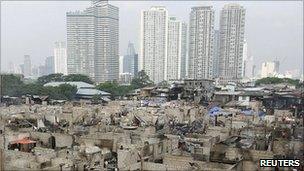Is the global food system slowly breaking down?
- Published
- comments

The slums sit cheek by jowl with skyscrapers in the capital of the Philippines, Manila
Quezon City, Philippines: I'm in Manila, the Philippines, making a documentary for Radio 4 about slums, of which more later. For now, speaking to priests and community leaders about what's driving people to leave the land and move into shanty-towns inside mega cities at a rate not seen in human history, there's an interesting and complex answer.
Top of the list is tornadoes: they are devastating agriculture and they usually take three years to filter through into economic impacts. You are seeing not just the young but also the elderly leave the land now because the rural economy is too fragile to cope with the effects of natural disasters.
Second, the impact of land reform: the government gives land to the farmers, but they have no money so they sell it immediately to agribusiness and move into the town.
Third, food security. Thirty percent of the rural population goes literally hungry at night, but 10% in the towns. In some ways you have to begin to see megacities as a survival response - all over the globe - to the climate and financial crises.
What does all this mean? Maybe it means - as the NGOs claim - that the global food system is beginning to break down.
It's a big thought after a day seeing slum dwellers clustered around well stocked fish and meat stalls today in Quezon City, but not contradictory.
The pressures are complex - a classic case of multicausal crisis that allows politicians and NGOs to just pick their "cause" and do what they can, with no certainty of solving it. They include climate change, resource depletion, rapid population growth, the commercialization of agriculture and also the energy resource crisis, which is forcing a switch in land use from food to fuel.
Charities are predicting a new food crisis in the horn of Africa next month, and that - by the year's end - we may see "hunger", as technically defined by the NGOs and aid ministries, rise again to include one in six people on the Earth.
Even as the global economy stages this faltering recovery, the new - more strategic challenges - of the first quarter of the century are emerging. We are measuring them above all at the bus stations of countries like this, where the authorities estimate one person a minute arrives with their worldly goods and a one-way ticket.